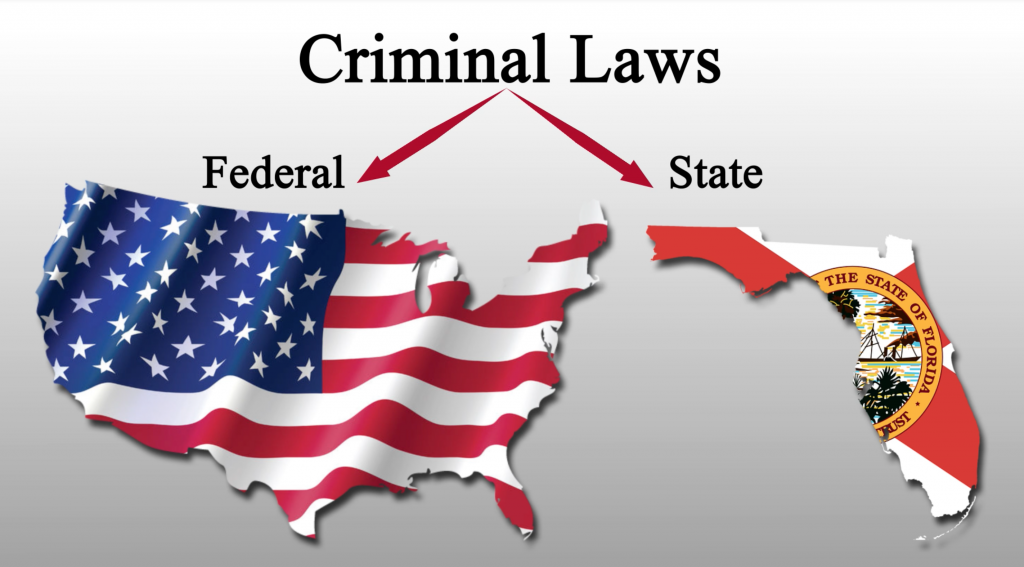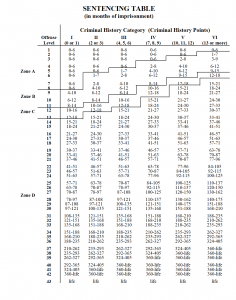
How are Federal Criminal Cases prosecuted Differently that Criminal Cases in the Florida State Courts?
Federal criminal cases are very different from criminal cases in Florida state courts. Below are examples of some of the differences.
The Manner of Investigation

Federal criminal investigations are generally proactive, while state criminal investigations are generally reactive.
Federal law enforcement agencies generally investigate a matter for some time before they make an arrest. In fact, by the time a person realizes that they are under federal investigation, federal law enforcement agents may have been investigating them for many months. In contrast, Florida law enforcement officers generally begin their investigation at or near the time of the arrest.
Federal Prosecutors Can Pick Their Cases
Sometimes, the federal criminal courts and the state criminal courts both have jurisdiction over a case. In these situations federal prosecutors have a choice – they can take the case themselves, or they can leave it to the state prosecutors. The federal prosecutor’s decision on whether or not to take the case will be based on the priorities of their U.S. Attorney’s Office, but they generally pick cases that they believe are going to be easy to prove. State prosecutors, on the other hand, don’t have this luxury. If a crime takes place in their jurisdiction and the federal prosecutors don’t take it, they have to deal with it.
Federal Grand Juries v. State Grand Juries
In Federal Court, the 5thAmendment to the U.S. Constitution requires that persons accused of a felony (a crime that can be punished by more than a year in prison) must be charged by a Federal Grand Jury Indictment unless the person voluntarily waives that right. In Florida Courts, the Florida Constitution requires only that those persons accused of a capital crime (a crime punishable by death) must be charged by a Grand Jury Indictment.
In both the Federal and Florida systems, when the charges don’t require an indictment, the prosecutor can charge the case in a document called an information.
The Federal Government Has Extensive Resources
Cases in federal court are investigated by agencies such as the FBI, DEA, Homeland Security, and Secret Service. These agencies, along with the United States Department of Justice, have large budgets, and essentially limitless resources with which to investigate alleged criminal activity. State agencies, on the other hand, generally have fewer resources at the disposal to investigate alleged criminal activity.
Are The Rules of Criminal Procedure In Federal Court Different than the Rules in Florida State Courts?
Yes, the rules of criminal procedure in federal court are different from the rules of criminal procedure in Florida State Courts.
For example, in Florida courts, the rules of criminal procedure allow for a defense attorney to depose (interview under oath) all of the witnesses that the state prosecutor intends to call at trial before the trial. In the federal system, however, the defense attorney generally is not allowed to depose witnesses before trial and often doesn’t even know who the witnesses will be until the first day of trial.
Is Federal Criminal Sentencing Law Different Than Florida Criminal Sentencing Law?
The rules for federal criminal sentencing are completely different than the rules for Florida criminal sentencing.

Federal judges, when deciding what sentence to impose, will consider a variety of factors, including the United States Sentencing Guidelines. The United States Sentencing Guidelines provide a suggested sentencing range of imprisonment, house arrest, or probation for the judge to impose. The length of the sentence the guidelines suggest is based on the severity of the offense (for example, in a drug case the weight of the drug), the defendant’s role in the offense, and the defendant’s criminal history. Federal judges take other factors into account, including the nature and circumstances of the offense, the history, and characteristics of the defendant, and the need to avoid unwarranted sentencing disparities. As long as the charged offense does not have a minimum mandatory sentence, federal judges have a tremendous amount of discretion in their sentencing decisions.
In contrast, as stated by the Florida Legislature, the primary purpose of sentencing in Florida state courts is to punish the offender.

When deciding what sentence to impose, Florida circuit court judges use a system called the Florida Criminal Punishment Code. That system assigns a certain number of points to the current charges, as well as additional points for any prior criminal history. Once a certain number of points are reached, the general rule is that the judge must sentence the offender to Florida state prison – the more points, the more prison time. Florida law does allow Florida Judges to sentence a defendant below the prison sentence required by the Florida Criminal Punishment Codein some circumstances. For example, if the judge finds that a defendant requires specialized treatment for a mental disorder unrelated to substance abuse, or that the need for payment of restitution to the victim outweighs the need for a prison sentence, or that the victim was an initiator, willing participant, aggressor, or provoker of the incident, then the judge can impose a probationary sentence rather than send the defendant to prison.
Posted in Federal Criminal Defense, Florida Criminal Defense
